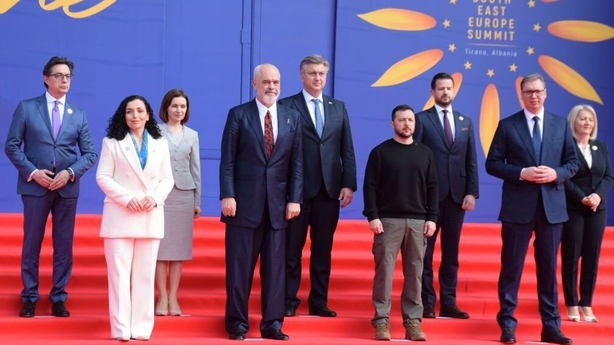President Volodymyr Zelensky has tried to drum up Balkan support for his vision of peace in Ukraine and promoted the idea of joint arms production at a two-day summit of southeastern European countries.
The summit in the Albanian capital Tirana comes as Kyiv is trying to improve its defensive capabilities to beat back Russian forces at a time of faltering US support more than two years into Russia's full-scale invasion.
"We are interested in co-production with you and all our partners," President Zelensky told top delegations from Albania, Bulgaria, Serbia, North Macedonia, Kosovo, Bosnia, Montenegro, Croatia, Moldova and Romania in his opening remarks.
He said: "There are about 500 defence companies operating in Ukraine, each of them adds strength but it is not enough to win (against Russian President Vladimir) Putin. We see the problems with the supply of ammunition, which affects the situation on the battlefield."
Mr Zelensky proposed organising a Ukrainian-Balkans defence forum in Kyiv or a Balkan capital to nurture arms cooperation, repeating similar initiatives conducted last year with British and US weapons companies.
Albania, Bulgaria, North Macedonia, Montenegro and Romania are NATO members, have joined Western sanctions against Russia and sent arms and equipment to Ukraine.
There are significant arms industries in parts of the Balkans, especially Serbia and Croatia, a legacy of former federal Yugoslavia.
Longtime Moscow ally Serbia has not imposed sanctions, and neither Belgrade nor Kyiv recognise the independence of Kosovo, Serbia's former predominantly Albanian southern province which backs Ukraine and is seeking European Union and NATO membership.
A joint declaration signed by ten countries at the summit said their leaders were ready to take part in a Ukrainian-led peace summit in Switzerland this spring to discuss President Zelensky's vision of peace.
His diplomatic peace initiative envisions a Russian military withdrawal from all of Ukrainian territory, has not involved Russia in talks so far and been dismissed by Moscow as a non-starter.
Albanian Prime Minister Edi Rama and Mr Zelensky held talks and signed an Agreement on Friendship and Cooperation between Ukraine and Albania, the leaders said.
Mr Zelensky told a news conference that every time weapons supplies to Ukraine were delayed it was a "gift" to President Putin, an apparent allusion to the months-long impasse in US Congress over providing more assistance for Kyiv.
The other leaders reiterated their support for Kyiv in a joint declaration, saying they were ready "to participate in the post-war recovery and reconstruction of Ukraine in order to enable the Ukrainian people to rebuild their country".
Mr Zelensky was in Saudi Arabia for talks yesterday seeking to promote his peace plan and discuss potential prisoner of war exchanges.

The country maintains relations with both Russia and Ukraine and has mediated between the warring parties before, including a deal struck in September 2022 that saw the release of more than 200 Ukrainians.
"A pivotal moment for fostering bilateral ties, and standing in solidarity with Ukraine in its heroic fight against Russia's aggression," Albanian Foreign Minister Igli Hasani wrote on X shortly after the Ukrainian leader's arrival at the summit.
During a visit to Albania earlier this month, US Secretary of State Antony Blinken praised Tirana's backing of Ukraine.
"It was one of the first countries to send military aid to Ukraine in the wake of the Russian aggression - guns, ammunition, mine resistant vehicles - and it's currently one of the top ten per capita in terms of its support for Ukraine and security assistance," Mr Blinken said.
European Union allies are rallying to address the shortfall in ammunition with a Czech-led plan to buy artillery from outside the bloc.
The EU is facing the prospect of having to shoulder more of the aid burden as funds from the US dry up.
Political infighting in the US Congress has stalled a vital $60 billion (€55.4bn) aid package, with the Republican right-wing, led by 2024 presidential candidate Donald Trump, souring against Ukraine's cause.
House Speaker Mike Johnson, an ally of Mr Trump and head of a razor-thin Republican majority, has refused to allow a vote on the package.
Meanwhile, French President Emmanuel Macron provoked backlash from fellow allies and a warning from Russia this week when he raised the possibility of sending Western troops into Ukraine.
The US and key European allies said they had no plans to do so.

